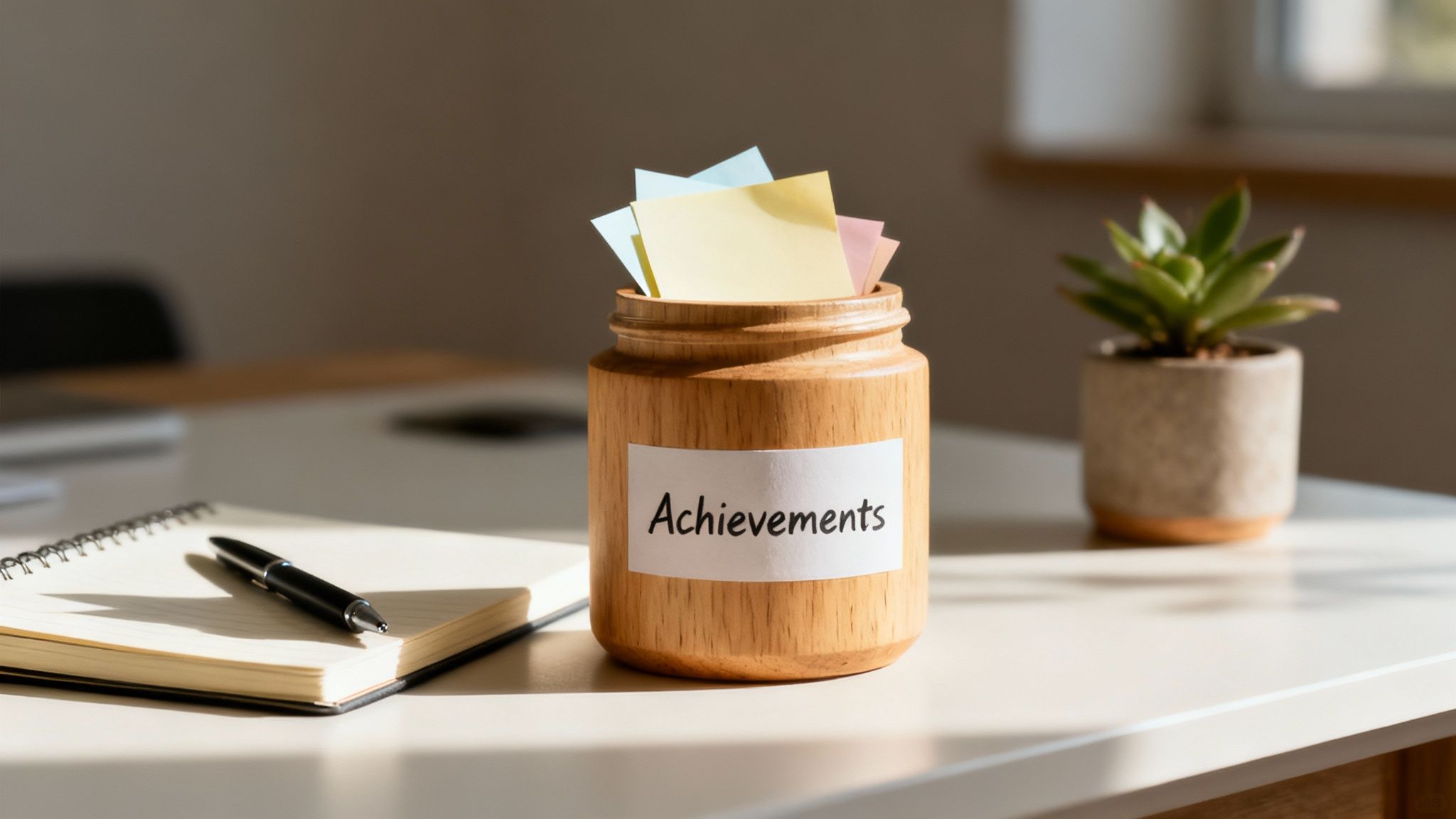Overcoming self-doubt is a journey, not an overnight fix. It starts with seeing this feeling for what it is: a common human experience, not a personal flaw. You can learn how to overcome self-doubt by understanding its roots, gently challenging negative thoughts, and building resilience with self-compassion.
This path is about learning to manage these feelings with kindness, not pretending they don't exist. It's a quiet, steady process of building a stronger, more supportive relationship with yourself.
Understanding What Self-Doubt Really Is
Before you can work with self-doubt, it helps to understand it. It’s not a character weakness but a near-universal feeling that often appears in high-pressure situations, like the modern workplace. It’s that quiet voice that questions your abilities before a big meeting or makes you feel like an imposter, even when you’re successful.
This feeling can be subtle, causing you to hold back ideas or downplay your achievements. The irony is that self-doubt often comes from caring deeply about your work and wanting to do well, which can lead to stress and anxiety if left unaddressed.
The Common Ground of Uncertainty
Imagine starting a new job in a busy city like Mumbai or Bengaluru, facing high expectations from family and society. This kind of pressure can easily lead to feelings of inadequacy and contribute to workplace stress. Realising you're not alone in this is a crucial step toward building genuine mental well-being.
Approaching this challenge with curiosity instead of self-criticism creates space for real growth. It allows you to explore these feelings without judgment, which is the foundation of building resilience and happiness.
This infographic lays out a clear comparison between the mindsets of self-doubt and confidence.
As you can see, self-doubt tends to fixate on perceived flaws and the potential for failure, while a confident mindset focuses on strengths and opportunities to learn and grow.
To help you get a clearer picture of where you stand, here’s a breakdown of common thought patterns and behaviours. Please remember, this table is for informational purposes only and is not a diagnostic tool.
Common Signs of Self-Doubt vs Self-Confidence
| Characteristic | Sign of Self-Doubt | Sign of Self-Confidence |
|---|---|---|
| Focus | On weaknesses and potential failures. | On strengths and past successes. |
| Decision-Making | Indecisive, second-guessing choices. | Decisive, trusts their own judgment. |
| Feedback | Takes constructive criticism personally. | Views feedback as a growth opportunity. |
| Goals | Avoids challenges due to fear of failure. | Sets ambitious goals and pursues them. |
| Social Interaction | Compares self negatively to others. | Celebrates the success of others. |
| Self-Talk | Harsh, critical inner dialogue. | Encouraging and compassionate self-talk. |
Seeing these side-by-side can be a real eye-opener, helping you pinpoint exactly where that inner critic is getting the upper hand.
A Deeper Look at the Indian Context
In India, conversations about mental well-being are becoming more open and urgent, especially for young people. The pressures of modern life can be intense, contributing to challenges like anxiety and depression. Acknowledging this reality is vital for fostering supportive communities.
It's important to build robust support systems that make professional help like therapy and counselling more accessible. You can read more about these mental health statistics in India30475-4/fulltext).
Acknowledging self-doubt is not admitting defeat; it's the beginning of a conversation with yourself. It's an opportunity to understand what truly matters to you and where you want to grow. This mindset shifts the focus from fear to resilience.
When you see self-doubt as a protective but often misguided internal alarm, you can start to disarm it. This understanding creates a supportive foundation to manage workplace stress and cultivate lasting confidence.
Identifying the Real Roots of Your Self-Doubt
Self-doubt is often an echo from past experiences, amplified by current pressures. Understanding where it comes from isn't about dwelling on the past but about spotting the triggers that keep those feelings alive today. This awareness is the first step toward regaining control.
Many of these triggers are external, tied to societal and cultural expectations. In India, for example, immense pressure to achieve specific career and life milestones can create a perfect environment for self-doubt to grow, making you feel like you're falling behind.

This feeling is magnified by daily life. Persistent workplace stress, a critical manager, or even scrolling through social media can reinforce the thought that you’re not good enough, chipping away at your resilience and overall well-being.
Common Triggers for Self-Doubt
Pinpointing your triggers is key to moving past them. Most tend to fall into a few familiar categories:
- Lingering Criticisms: A harsh comment from a parent, teacher, or boss can stick with you, becoming the voice of your inner critic.
- The Comparison Trap: Constantly measuring your journey against someone else's highlight reel can diminish your own accomplishments.
- High-Stakes Environments: Intense competition at work or university can lead to feelings of inadequacy and even burnout.
- Facing the Unknown: Starting a new job or a big project can bring deep-seated fears of failure to the surface.
A huge part of this journey is learning how to start overcoming limiting beliefs and rewriting your narrative so you can truly empower yourself.
How Societal Pressures Affect Our Well-being
It's important to consider the bigger picture, especially in places where discussing mental health is still gaining acceptance. In India, the stigma around mental health challenges can be a significant hurdle, making it difficult for people to seek help for self-doubt, anxiety, or depression.
This silence can lead to social exclusion, worsening feelings of inadequacy and preventing people from getting the support they need. This journey toward better well-being is something many people around the world can relate to.
Takeaway: Your self-doubt is not a personal failure. It’s almost always a reaction to outside pressures and things you’ve been through. By gently exploring these roots in a safe space—maybe with a counsellor or therapist—you can start to untangle your true self-worth from all that external noise.
Practical Ways to Challenge Those Negative Thoughts
Once you understand where your self-doubt comes from, you can start to challenge it. This isn't about ignoring negative thoughts but questioning them with gentle curiosity. It's like building a mental toolkit to navigate anxiety and feel better about yourself, one thought at a time.
This involves practical techniques, many used in professional counselling, that help create distance from that critical inner voice. Like any skill, it gets stronger with practice, paving the way for lasting confidence.
Play Detective with Your Fears
Negative thoughts often feel like facts, but they are usually just anxious assumptions. The next time your mind says, "I'm going to completely bomb this presentation," treat it as a theory to investigate, not the truth.
Ask yourself a few simple questions:
- What's the evidence for this thought? Maybe you feel nervous or are unsure about one slide.
- What's the evidence against it? You've given successful presentations before. You know the material well.
- What’s a more realistic, balanced view here? "I'm nervous about this presentation, but I've prepared well and have succeeded before. I can handle this."
This simple act of questioning can stop an anxiety spiral and bring you back to reality. It shifts your focus from a feared catastrophe to your actual abilities, building resilience.
Change the Story You're Telling Yourself
The way you frame a situation greatly impacts how you feel. Reframing is choosing a more helpful or kind perspective, a powerful tool for managing workplace stress or performance anxiety.
For instance, if you get some tough feedback on a project, your first thought might be, "I'm just not good at my job." This is a dead-end thought that only fuels more self-doubt and can lead to burnout.
Now, let's try reframing it.
"This feedback isn't a verdict on my entire career. It's a chance to learn something new and get even better on the next project."
This subtle shift turns criticism from a personal attack into a practical lesson for growth. It acknowledges the challenge while focusing on progress, which is the essence of building resilience and happiness.
Keep a "Success Jar"
Our brains often hold onto failures and forget successes due to a negativity bias. To counter this, create a tangible record of your wins with a 'success jar' or a simple digital folder. This is a foundational piece in applying proven strategies to build self-confidence.
Whenever you do something you're proud of, big or small, write it down and put it in the jar.
- Received a kind email from a client.
- Finished a task you'd been avoiding.
- Helped a teammate with a problem.
- Shared your idea in a meeting.
When self-doubt creeps in, pull out a few notes. These reminders provide concrete proof of your competence, helping you build a more accurate and positive self-image and improve your overall well-being.
Building Resilience Through Self-Compassion
Think about how you speak to a friend who is struggling. It's likely with kindness and support. Yet, when self-doubt arises after a setback, our inner critic can be harsh, creating stress and anxiety.
The most effective way to quiet that voice is not to fight it but to practice self-compassion. This isn't about making excuses; it's about offering yourself the same understanding you would give a friend, which is foundational for long-term well-being and preventing burnout.

From Self-Criticism to Self-Kindness
Practicing self-compassion helps you shift from harsh judgment to supportive encouragement. This is a game-changer when navigating workplace stress or feelings of inadequacy. Over time, this builds genuine resilience, helping you bounce back from challenges without them damaging your self-worth.
Imagine a project you led didn't meet its goals. The self-critical voice might say, "I failed. I knew I wasn't cut out for this." A self-compassionate response sounds different: "This is disappointing, and it's okay to feel that way. What can I learn from this for next time?"
This small change stops the negative cycle that fuels anxiety and can contribute to depression. It acknowledges the difficulty but pivots toward growth, which is a core component of positive psychology.
Self-compassion is the practice of treating yourself with the same care and support you'd offer a good friend. It acknowledges that imperfection is a shared human experience, fostering resilience instead of self-criticism.
A Quick Self-Compassion Break
You can do this simple exercise anywhere to ground yourself when you feel overwhelmed. It has three simple parts and is an informational technique, not a diagnostic tool.
- Acknowledge the Pain: Say to yourself, "This is a moment of difficulty," or "This hurts."
- Recognise Shared Humanity: Remind yourself, "Struggles are a part of life," or "Other people feel this way, too."
- Offer Kindness to Yourself: Gently place a hand over your heart and say, "May I be kind to myself," or "May I give myself the compassion I need."
Self-Criticism vs Self-Compassion In Practice
Rewiring your internal script takes consistent effort. This table shows how this shift looks in day-to-day situations, offering compassionate alternatives to self-critical thoughts.
| Situation | Self-Critical Response | Self-Compassionate Alternative |
|---|---|---|
| Making a mistake at work | "I'm so stupid. I can't do anything right." | "Everyone makes mistakes. This is an opportunity to learn." |
| Receiving negative feedback | "They think I'm a failure. I'll never be good enough." | "This feedback is hard to hear, but it will help me improve." |
| Feeling overwhelmed | "I should be able to handle all of this. I'm weak." | "It's understandable to feel overwhelmed right now. It's okay to ask for help." |
If you find this shift difficult, professional counselling can offer a guided and supportive space to develop this skill. Choosing self-compassion gives you the emotional resources to navigate life's challenges with more grace and is the foundation of lasting confidence.
Knowing When and How to Seek Support
Working to overcome self-doubt is admirable, but you don't have to do it alone. Sometimes, a persistent inner critic is connected to deeper challenges like burnout, anxiety, or depression. Recognizing you might need support is a sign of strength and self-awareness.
Sometimes, the first step is talking to someone you trust, like a friend, family member, or mentor. Hearing an outside perspective can cut through the noise in your head and make a world of difference.

If that doubt constantly affects your work, relationships, or happiness, professional help can be invaluable. Therapy and counselling provide a confidential, judgment-free space to explore these feelings with a trained professional who can offer personalized tools.
What to Expect from Professional Support
The idea of therapy can feel intimidating, but it’s really just a conversation. A therapist is there to listen, understand your experience, and work with you to create a plan. Any assessments used are informational tools to guide the process, not to label you.
Think of it as a supportive partnership. In your sessions, you will likely discuss your goals, pinpoint triggers, and learn new coping skills to build lasting confidence and resilience.
Seeking help isn't about finding a "cure." It's about developing the self-awareness and resilience to manage that inner critic so it no longer runs the show.
Finding the Right Support in India
Thankfully, the conversation around mental health in India is becoming more open. Initiatives like the National Tele Mental Health Programme (Tele MANAS) are making a huge impact by offering free, accessible mental health support. This positive shift is mirrored in many countries worldwide, making it easier to get help without judgment.
You can learn more about these government mental health initiatives and the resources available. Taking the first step, whether by talking to a friend or finding a professional counsellor, is a powerful act of self-compassion and an investment in your well-being.
A Few Common Questions About Self-Doubt
As you build a more compassionate relationship with yourself, it's normal to have questions. Here are supportive answers to some common queries to help you move forward with more confidence.
How Can I Tell the Difference Between Self-Doubt and Humility?
This is an important question. The key difference is the feeling behind it. Humility comes from a place of quiet, realistic self-awareness, where you know your strengths but also recognize you have room to grow.
Self-doubt, however, often stems from insecurity and anxiety. It makes you undervalue your abilities and dismiss your achievements as luck. Humility encourages growth, while self-doubt keeps you feeling stuck.
Can Counselling Really Help with Workplace Self-Doubt?
Yes, absolutely. Professional counselling offers a safe space to explore the triggers behind your workplace stress and self-doubt. A therapist can help you identify the root causes and provide personalized strategies to cope.
The goal of therapy isn't a quick fix but to build genuine skills for resilience and self-awareness that support your career and overall well-being. Speaking with an objective professional can offer invaluable clarity.
A quick note: The insights from any assessment or therapy session are for informational purposes, not a diagnosis. Think of them as tools to empower your journey of self-discovery, helping you understand your patterns so you can build a more fulfilling life.
What Is One Small Action I Can Take When Self-Doubt Feels Overwhelming?
When anxious thoughts feel overwhelming, grounding yourself in the present moment is a powerful tool. This simple mindfulness exercise acts as a circuit breaker for your brain.
Try this right now: name three things you can see, acknowledge three sounds you can hear, and move three parts of your body. This quick practice pulls your focus from internal chaos to your external environment, creating enough space to calm your nervous system.
Is It Possible to Eliminate Self-Doubt Completely?
It's more realistic and healthier to aim for managing self-doubt rather than eliminating it entirely. A small amount of self-doubt can be useful—it keeps us humble and encourages preparation. The goal is to prevent it from becoming a paralyzing force that holds you back.
With practice and self-compassion, you can learn to turn down the volume. You can reach a point where you notice the feeling, acknowledge it without judgment, and then move forward with confidence. This journey is not about winning a battle but about managing a relationship with yourself with kindness and growing strength.
Ready to understand yourself a little better? At DeTalks, we can connect you with qualified therapists and provide you with science-backed tools to support your mental health journey. Explore our resources and find the right support for you today.

Leave a Reply